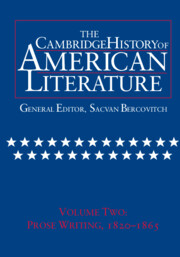Book contents
- Frontmatter
- Introduction
- CONDITIONS OF LITERARY VOCATION
- THE LITERATURE OF EXPANSION AND RACE
- THE TRANSCENDENTALISTS
- 1 Unitarian Beginnings
- 2 The Assault on Locke
- 3 Carlyle and the Beginnings of American Transcendentalism
- 4 “Annus Mirabilis”
- 5 The Establishment and the Movement
- 6 Letters and Social Aims
- 7 The Hope of Reform
- 8 Diaspora
- 9 The Antislavery Years
- NARRATIVE FORMS
- Chronology
- Bibliography
- Index
4 - “Annus Mirabilis”
from THE TRANSCENDENTALISTS
Published online by Cambridge University Press: 28 March 2008
- Frontmatter
- Introduction
- CONDITIONS OF LITERARY VOCATION
- THE LITERATURE OF EXPANSION AND RACE
- THE TRANSCENDENTALISTS
- 1 Unitarian Beginnings
- 2 The Assault on Locke
- 3 Carlyle and the Beginnings of American Transcendentalism
- 4 “Annus Mirabilis”
- 5 The Establishment and the Movement
- 6 Letters and Social Aims
- 7 The Hope of Reform
- 8 Diaspora
- 9 The Antislavery Years
- NARRATIVE FORMS
- Chronology
- Bibliography
- Index
Summary
In the spring of 1836, the year that Perry Miller would call the “Annus Mirabilis” of the Transcendentalist movement, the American Unitarian Association issued a small pamphlet entitled Christianity as a Purely Internal Principle. Its author was a forty-year-old minister named Convers Francis (1795–1863), a genial man whom O. B. Frothingham called “a liberal scholar, in the best sense of the phrase; learned without pedantry; open to the light from every quarter; an enormous reader of books; a great student of German philosophy and divinity, as few at that time were.” Francis had occupied the pulpit at Watertown, Massachusetts, since 1819, preaching a liberal Christianity that emphasized the human element in the Bible and publishing reviews in the Christian Examiner in which he affirmed his belief that the human soul was “a particle of the divine mind.” In Christianity as a Purely Internal Principle Francis argues that Christianity's distinction lies in its having been “the first and only system, which professed to build its kingdom wholly within the soul of man.” All attempts to derive religious feeling from something outward — whether the rituals of the Catholic church or the emotional conversion experiences of the evangelicals — are false to the spirit of Christianity's founder, who asked “for no province but the affections, principles, and motives of man, for no throne but his heart.”
Francis's pamphlet, an eloquent expression of Unitarian piety, contained nothing radical, though its emphasis on Christianity as an inward principle of spiritual enlargement made it dear to the younger people whom he served as friend and mentor. Francis's slight reputation for daring came from his willingness to entertain ideas bolder than his own.
- Type
- Chapter
- Information
- The Cambridge History of American Literature , pp. 376 - 391Publisher: Cambridge University PressPrint publication year: 1995

